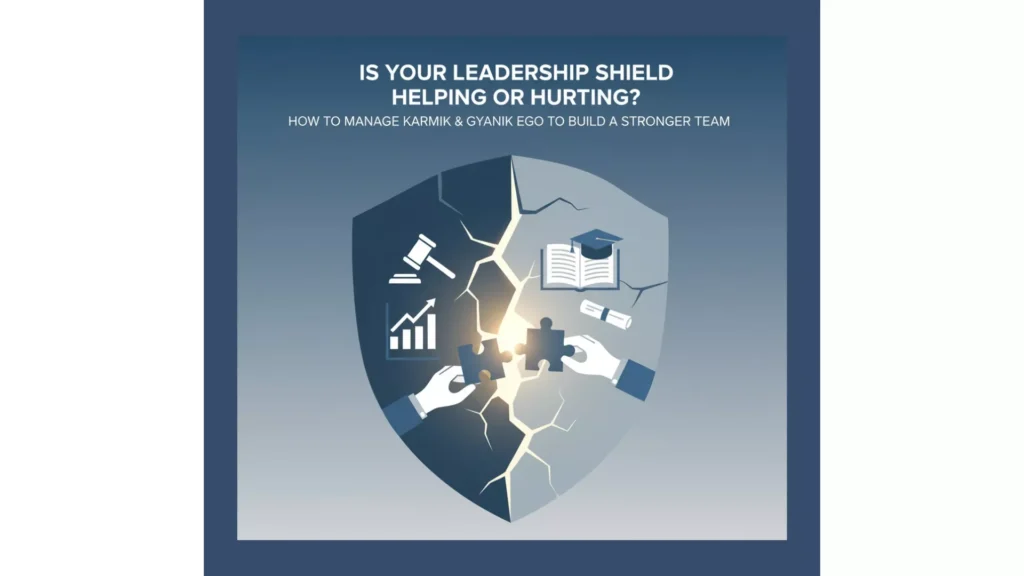In the corridors of schools and universities, where mission statements proclaim student-centered values and collaborative cultures, a subtler challenge often undermines these ideals: the dual manifestations of leadership ego. While educational discourse has long acknowledged the pitfalls of authoritarian leadership, a more nuanced understanding reveals two distinct forms of ego that can compromise institutional effectiveness—what might be termed karmik ego (action-oriented) and gyanik ego (knowledge-oriented).
Table of Contents
Understanding these distinctions and developing practical strategies to recognize and manage them represents not merely a professional development exercise, but a fundamental reimagining of leadership consciousness in educational settings.

The Nature of Educational Ego: A Framework
Karmik Ego: The Grip of Doing
Karmik ego manifests in leaders through an excessive attachment to action, control, and visible output. This form expresses itself in defensiveness when decisions are questioned, a compulsive need to be consulted on every detail, and discomfort when others receive recognition. Leaders caught in karmik patterns measure their worth by their visible contributions and experience irritation when processes unfold without their direct involvement.
Research on ego development in school principals reveals that leaders at different stages of ego maturity demonstrate markedly different sense-making capabilities and organizational impacts. In schools, karmik ego appears as the principal who cannot delegate meaningful authority, the department head who must approve every syllabus modification, or the superintendent who treats district-level initiatives as personal projects requiring their stamp on every phase.
As noted in Harvard Business Review’s analysis of leadership pathologies, an inflated ego narrows the field of vision and corrupts behavior, often causing leaders to act against their stated values. This dynamic proves particularly corrosive in educational settings where modeling integrity and fostering autonomy are fundamental to the mission.
Gyanik Ego: The Tyranny of Knowing
Gyanik ego, equally corrosive but often more socially acceptable in academic environments, centers on intellectual superiority. It reveals itself through impatience with those who grasp concepts less quickly, subtle dismissal of ideas from colleagues with fewer credentials, and a tendency to speak to impress rather than to clarify. Leaders exhibiting gyanik patterns demonstrate reluctance to admit ignorance and habitually frame disagreements as intellectual deficits in others.
This manifests as the curriculum director who patronizes teachers with less theoretical background, the academic dean who treats faculty meetings as lecture opportunities, or the principal who responds to every concern with a citation rather than genuine dialogue. The concept of “quiet ego,” explored in recent studies of ethical leadership in education, suggests that effective leaders cultivate an approach that balances confidence with genuine intellectual humility.
The Case for Ego-Transcendent Leadership
Jim Collins’s landmark research on organizational transformation identified what he termed “Level 5 Leadership”—characterized by a powerful mixture of personal humility and indomitable will, where ambition is first and foremost for the cause and the organization’s purpose, not themselves. Collins found that Level 5 leaders display humility, will, ferocious resolve, and the tendency to give credit to others while assigning blame to themselves.
This leadership model directly challenges both karmik and gyanik ego patterns. Where karmik ego demands visible credit for action, Level 5 leadership redistributes attribution. Where gyanik ego hoards intellectual authority, ego-transcendent leadership creates space for collective wisdom.
Peter Senge’s conception of the learning organization offers complementary insights. In learning organizations, leaders are responsible for building organizations where people are continually expanding their capabilities to shape their future—that is, leaders are responsible for learning. This framework fundamentally reorients leadership identity from “the one who knows” to “the one who cultivates conditions for knowing.”
Internal Diagnostics: Self-Recognition as Foundation
Before leaders can cultivate ego-aware cultures, they must develop sophisticated self-recognition practices. This requires moving beyond superficial acknowledgment of one’s flaws to systematic internal diagnostics.
For Leaders Confronting Karmik Tendencies
The fundamental shift involves reframing identity from “I am the decider” to “I create conditions for good decisions.” This cognitive reorientation must be supported by specific practices: attribution discipline that publicly and specifically credits others’ contributions, even when the leader initiated the process; designated “ego-free zones” in which the leader’s role is purely to listen and synthesize rather than direct; and conscious cultivation of detachment, particularly after launching initiatives, allowing others to own implementation.
For Leaders Addressing Gyanik Patterns
The antidote to intellectual ego begins with institutionalizing reverse mentoring—formally learning from younger teachers, support staff, or students about domains where they possess expertise. Leaders must adopt a public learning posture, modeling uncertainty by sharing what they are currently learning or struggling to understand. The impulse to demonstrate knowledge should be redirected; when tempted to display expertise, the ego-aware leader asks questions that help others discover insights themselves. Finally, deliberately approaching familiar topics with beginner’s mind, especially when engaging with those who think differently, counteracts the ossification of intellectual certainty.
Structural Interventions: Creating Ego-Revealing Systems
Individual awareness, while necessary, remains insufficient. Educational institutions require structures that surface ego patterns and create accountability.
Decision Archaeology and Shadow Tracking
Progressive schools are implementing “decision archaeology”—periodic tracings of how major decisions were made, examining who influenced them, whose voices were absent, and what assumptions went unquestioned. Complementing this, “shadow tracking” invites trusted colleagues to observe leadership meetings and note when ego patterns emerge through interruptions, subtle dismissals, or credit-taking language.
These practices transform ego management from private introspection to collective inquiry, normalizing the examination of power dynamics that typically remain invisible. Research on ethical leadership in educational settings emphasizes the importance of structured self-reflection for nurturing moral consciousness in leaders.
360-Degree Reflection Processes
Distinct from evaluations, these reflection processes gather anonymous team feedback on leadership behaviors through targeted questions: “When do you feel most and least heard?” “What decisions surprised you and why?” “When have you seen someone’s expertise dismissed?” The emphasis on reflection rather than evaluation creates psychological safety for honest disclosure while providing leaders with actionable insight into their impact.
Cultivating Ego-Aware Institutional Cultures
Sustainable change requires embedding ego awareness into organizational DNA through both structural mechanisms and linguistic shifts.
Shared Leadership Protocols
Systematic reviews of leadership models in educational research reveal that distributed leadership has become one of the most studied models in educational research, reflecting growing recognition that singular leadership models prove insufficient for complex educational challenges.
Institutions can rotate facilitation of key meetings, distribute decision-making authority across clear domains, and establish forums specifically for discussing failures and lessons learned—with leaders modeling vulnerability first. Multi-directional accountability channels enable students, newer teachers, and support staff to question leadership decisions through structured processes.
The principle of “strong opinions, weakly held” should be actively cultivated—advocating passionately while remaining genuinely open to being wrong. This paradoxical stance honors conviction while acknowledging fallibility.
The Power of Language
The words leaders use construct reality. Replacing “I implemented” with “We discovered,” “My vision is” with “What if we explored,” and “This is best practice” with “Here’s what the evidence suggests, and here’s what I’m uncertain about” fundamentally alters the epistemological stance of leadership.
These are not merely semantic substitutions but cognitive reprogramming that shifts authority from position to service, knowledge from power to gift, and leadership from knowing to convening wisdom.
Practical Integration: Weekly and Quarterly Disciplines
Theory without practice remains inert. Leaders committed to ego awareness benefit from specific exercises:
Weekly Reflection Questions:
- What did someone teach me this week that genuinely surprised me?
- When did I feel the urge to control or correct, and what was I protecting?
- Whose idea did I resist, and what was my real reason?
- Who contributed to a success that I haven’t yet acknowledged?
Quarterly Team “Ego Audits”: Teams privately complete prompts such as “A decision I wish we’d made differently,” “A perspective I don’t think we’re hearing,” or “A time I felt intellectually dismissed.” Themes—not attributions—are shared collectively, and patterns are addressed through problem-solving rather than blame.
These practices align with Collins’s observation that Level 5 leaders represent a study in duality: modest and willful, humble and fearless. The structured reflection required to maintain this balance cannot be left to chance but must become institutionalized practice.
The Deeper Transformation: From Elimination to Integration
The ultimate realization for educational leaders is that ego is not eliminated but integrated and redirected. The aspiration is not egolessness—an impossible and arguably undesirable state—but ego transparency: awareness of when ego arises, honesty about its influence, and organizational structures that compensate for its distortions.
Sustainable excellence in educational institutions emerges not from leaders’ brilliance or control but from creating conditions where collective intelligence can flourish—including intelligence about when leaders’ own egos limit that flourishing.
This represents a profound shift in leadership consciousness, from viewing oneself as the source of institutional wisdom to recognizing oneself as a curator of conditions for wisdom’s emergence. It requires intellectual humility without false modesty, confidence without arrogance, and authority exercised as service rather than privilege.
The research on learning organizations supports this transformation. Organizations thrive when leaders understand that their primary responsibility is not to be the smartest person in the room but to build systems where everyone’s intelligence can contribute to collective outcomes.
Context-Specific Applications
The strategies outlined here require adaptation based on institutional context. Elementary schools may emphasize more collaborative, relationship-based interventions, while secondary schools might implement more structured protocols given their departmental complexities. Schools in early stages of organizational development may need to build basic trust before implementing sophisticated ego-awareness practices, while mature institutions can engage in more subtle interventions.
What remains constant across contexts is the fundamental recognition: the quality of educational leadership is determined not by what leaders know or do, but by their capacity to create space for others’ knowing and doing—and their willingness to examine what in themselves constrains that space.
Conclusion: The Leadership We Need
The challenges facing contemporary education—from rapid technological change to evolving pedagogical understanding to increasingly diverse student populations—demand leadership that transcends traditional ego-driven models. Collins notes that one of the most damaging trends in recent history is the tendency of boards to select dazzling, celebrity leaders while de-selecting potential Level 5 leaders.
Educational institutions must resist this trend. The future belongs not to leaders who know all the answers or control all the processes, but to those who can create conditions for collective wisdom to emerge. This requires leaders courageous enough to confront their own karmik and gyanik ego patterns, institutions willing to build structures that reveal and address these patterns, and cultures that celebrate ego transparency over ego denial.
The transformation of educational leadership begins with leaders courageous enough to examine not just their schools, but themselves—recognizing that the most important classroom may be their own consciousness, and the most challenging curriculum may be their own ego.
References
Raskin, R. (2018). Ego is the enemy of good leadership. Harvard Business Review. Retrieved from https://hbr.org/2018/11/ego-is-the-enemy-of-good-leadership



